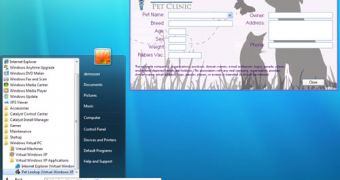On Friday, Microsoft reportedly confirmed that Windows 7 would have an emulation mode, similar to what Apple called Classic, addressing the needs of those still needing to run Windows XP solutions. The mode delivers what can be referred to as a “Windows XP environment” for XP programs.
The news comes via tech-focused site Electronista, which points out to Microsoft's confirmation last week that “Windows 7 will have a new, special emulation mode tailored to businesses and others that need an exact Windows XP environment for their apps. [...] Similar to Classic in earlier versions of Mac OS X, the simply-titled XP Mode creates a complete virtual session (using Virtual PC) for XP apps that is nearly hidden for the user; software is installed in XP Mode, but runs as though it were a native app, with only an XP-style title bar to indicate that the software is in emulation.” Microsoft has also confirmed that the feature will not replace regular backwards compatibility in Windows 7.
Microsoft has also affirmed, according to the same report, that Windows 7 will not ship with this compatibility tool. Instead, “XP-mode” will be available as a separate download only for Windows 7 Professional and Ultimate users. The download will be free of charge. And now, a few details on Apple's Classic...
About Classic
Any Mac fanatic can tell you that PowerPC versions of Mac OS X prior to 10.5 include a compatibility layer called Classic. The Classic “environment” enables users to run applications and hardware requiring Mac OS 9 from within Mac OS X. However, this is achieved through booting a full Mac OS 9 system. Therefore, Mac OS 9 must be installed on the computer for Classic to work. Most Mac OS 9 applications are supported by Classic.

 14 DAY TRIAL //
14 DAY TRIAL //